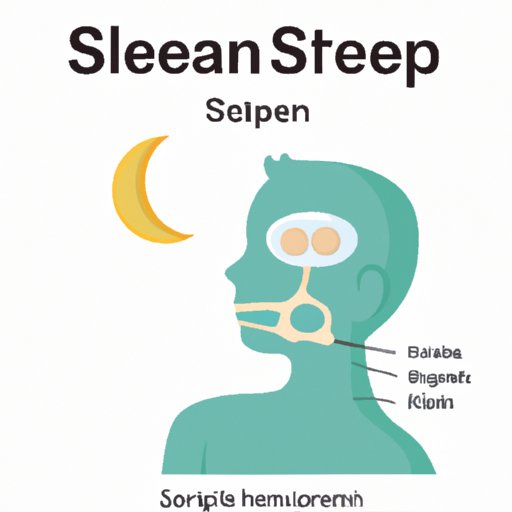
I. Introduction
Do you often wake up feeling tired and groggy? Is snoring and interrupted breathing keeping you and your partner up at night? If you answered yes to any of these questions, it’s possible that you may be suffering from sleep apnea. Sleep apnea is a common sleep disorder that affects millions of people worldwide. In this article, we will explore the various symptoms of sleep apnea and why it’s important to seek help if you suspect that you may have it.
II. Sleep Apnea Symptoms: How to Identify if You Have it or Not
There are three main types of sleep apnea: obstructive, central, and mixed. Obstructive sleep apnea is the most common type and occurs when the muscles in the back of the throat fail to keep the airway open. Central sleep apnea is caused by a failure of the brain to send signals to the muscles that control breathing. Mixed sleep apnea is a combination of obstructive and central sleep apnea. Regardless of the type, all forms of sleep apnea share similar symptoms, which include:
- Loud snoring
- Gasping for air during sleep
- Intermittent pauses in breathing
- Waking up frequently at night to use the bathroom
- Waking up with a dry or sore throat
If you experience any of these symptoms, it’s important to visit your healthcare provider for a proper diagnosis.
III. The Telltale Signs of Sleep Apnea: Not Just Snoring
While snoring is a common symptom of sleep apnea, it is not the only one. People with sleep apnea may also experience:
- Daytime fatigue
- Morning headaches
- Difficulty concentrating
- Irritability or mood swings
- Depression
It’s important to recognize all of these symptoms and take them seriously, as they can signal a serious underlying health condition. Keep in mind that not everyone with sleep apnea experiences all of these symptoms.
IV. Why Ignoring These 5 Symptoms of Sleep Apnea May Put Your Health at Risk
Left untreated, sleep apnea can increase the risk of developing several serious health conditions, including:
- High blood pressure
- Heart disease
- Stroke
- Type 2 diabetes
- Depression
By recognizing and seeking treatment for these five symptoms, you can reduce your risk of developing these health issues:
- Excessive snoring
- Waking up gasping for air
- Daytime fatigue
- Difficulty concentrating
- Morning headaches
V. Sleep Apnea: What to Look for and How to Get Help
If you suspect that you have sleep apnea, here are some steps you can take to get a proper diagnosis and treatment:
- Speak to your healthcare provider about your symptoms
- Undergo a sleep study to monitor your breathing while you sleep
- Consider treatment options, such as CPAP machines, weight loss programs, and positional therapy
It’s important to seek help from a healthcare professional to get the proper diagnosis and treatment for sleep apnea. With the right treatment, you can reduce your symptoms and improve your overall quality of life.
VI. Debunking Common Myths About Sleep Apnea: Uncovering the True Symptoms
There are several myths about sleep apnea that can make it difficult for people to recognize if they have it. Some of these myths include:
- Only overweight people get sleep apnea
- Snoring is always a symptom of sleep apnea
- Sleep apnea only affects men
It’s important to understand that anyone can develop sleep apnea, regardless of their weight or gender. Additionally, not everyone who snores has sleep apnea. By understanding the true symptoms of sleep apnea, you can better recognize if you or a loved one may be suffering from it.
VII. Feeling Tired All the Time? Here’s How to Know if Sleep Apnea is the Culprit
Are you struggling to stay awake throughout the day, even after a full night’s sleep? Excessive daytime fatigue is a common symptom of sleep apnea. To determine if sleep apnea may be to blame, track your symptoms and speak to your healthcare provider.
- Keep a sleep diary to track when you go to bed and wake up, how many times you wake up during the night, and how tired you feel throughout the day.
- Speak to your healthcare provider about your symptoms and undergo a sleep study to monitor your breathing while you sleep.
VIII. Conclusion
Sleep apnea is a serious sleep disorder that can negatively affect your quality of life. By recognizing the symptoms and seeking help from a healthcare professional, you can reduce your risk of developing serious health conditions and improve the quality of your sleep. If you suspect that you or a loved one may be suffering from sleep apnea, seek help today.





